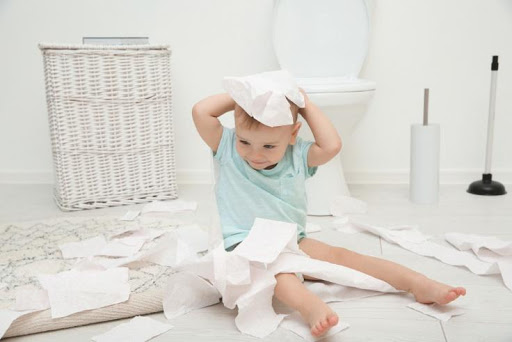Problems with kids flushing toys or paper, turning on faucets or putting debris or dirt into your drains. Learn what to do to keep your kids from destroying your bathroom.
Kids are forces of destruction and ruin — every mother knows this. It’s not your little one’s fault; they are trying to learn about the world, and they just happen to be creating devastation in their wake. Fortunately, most of the chaos wrought by young children isn’t too severe — unless it has to do with the plumbing.
Most households experience some kind of plumbing problem at the hands of children; it must be some unseen magic that beckons kids to do bad things to sinks, toilets and pipes. If you want to avoid a similar fate, here are a few of the most common kid-related plumbing catastrophes and some strategies for preventing them.
Flushed Toys
When your kid wants to see how the Hatchimals react to cold water — or when your kids insist that Barbie wants to go for a relaxing dip — your toilet is in extreme danger. Plumbing handles water and a small amount of relatively soft waste; it isn’t prepared to transport large, hard toys to the sewer.
Thus, when your kids try to (accidently or not) flush their stuff down the toilet, it’s almost certain to cause a clog.
When your kids are young and not using the potty, you can place lid locks on all the toilets in your home. As they get older, you have to remove the locks from the toilets your kids use, but you should keep any guest bathrooms under lock and key.
As always, it’s a good idea to communicate with your kids about the dangers of playing with toys in the toilet, stressing the impact it will have on them (i.e. they’ll lose a toy forever) and on you (i.e. you’ll have to pay for someone to fix it). With enough stress on this lesson, your kids should keep well away from the toilet during play.
Flushed Paper
Toys aren’t the only danger kids pose to toilets. American plumbing and sewers can sweep away a small amount of easily dissolved toilet paper, but that doesn’t mean it is equipped to manage all sorts of paper.
Plenty of paper products do not belong anywhere near a toilet; in fact, some products advertised for use in the bathroom, like sanitary wipes or flushable wipes, are definitely not good for your pipes.
Because hardier paper products do not dissolve, they form wads that block the passage of water. Over time, your sewer line will get clogged, or else you’ll contribute to the growing fat-berg problem in cities everywhere.
It’s important to teach your kid to use only a small amount of toilet paper to clean themselves after using the potty. You might set a good example for your little ones by flushing nothing else but waste and a square or two of TP. Even better, you can transition your family to bidets or lotas and keep all paper products out of the bathroom.
Pulled Faucets
The average bathroom counter is just a bit too tall for most kids to reach the sink. If a step-stool isn’t handy, most kids will clamber onto the counter by grabbing and pulling on the faucet — which causes a whole bunch of damage over time.
If you’ve been lax about this, you can call in Miami faucet repair services to see if your faucets need fixing. Know that pulling on the faucet can disconnect it from the water lines, causing leaks that damage your countertops, cabinets, walls and floors, meaning allowing kids to use faucets as a hand-hold is like asking for sky-high water and repair bills in the future. A step-stool is the cheapest and easiest solution to this problem.
Sink and Shower Debris
Let’s assume your kids aren’t playing inside the bathroom; maybe they aren’t playing inside at all. Unfortunately, this could mean your little one is exploring the outdoors, getting their hands and bodies covered in mud, leaves and other debris. This gunk is just as bad for your pipes as toys and paper, especially because sinks and showers are only supposed to handle water — no chunks of any kind.
Gritty stuff like mud and sand can erode your pipes, and junk like leaves and twigs will cause blockages.
You should avoid the temptation to remove clogs with any chemicals, which can damage your pipes and even solidify the junk stuck in them. Instead, call professionals to take a look — and in the meantime, ask your kids to rinse off with a hose outside.
Kids can do all sorts of damage to every part of your home, but they seem to reserve the worst kind of terrorism for your plumbing. With diligent parenting, strict rules and proper maintenance, you can keep your pipes working well, even with little ones in the house.
MORE PLUMBING ADVICE:
